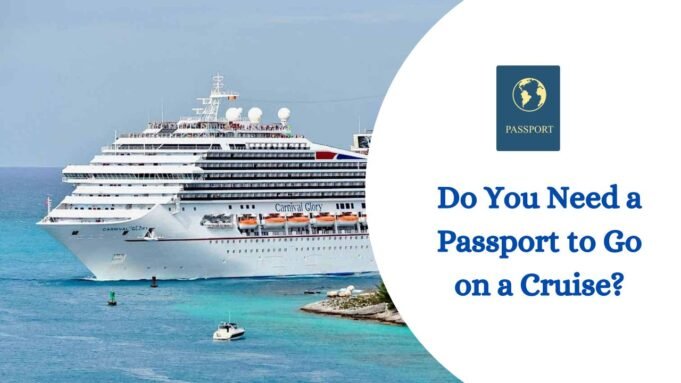Yes, depending on the destination, departure port, and citizenship, you may need a passport to travel on a cruise. Royal Caribbean, for example, recommends having a valid passport, whereas Carnival strongly advises it. A government-issued photo ID may suffice if you’re a US citizen on a closed-loop cruise.
A passport is more than just a piece of paper. It is a key that unlocks the world of travel opportunities. With a visa, you can explore different cultures, cuisines, landscapes, and experiences. You can also enjoy the benefits of visa-free travel to many destinations, such as the Caribbean, Europe, and Asia.
In this blog post, I will share what documents you need for a cruise. If you want to know, Keep reading!
What Document Do I Need for a Cruise?
The document you need for a cruise depends on several factors, such as:
- Your citizenship and residency status
- The country where you are embarking and disembarking the cruise ship
- The countries you are visiting during the cruise
- The duration and type of the cruise
- The cruise line’s policy and terms and conditions
Generally speaking, if you are a U.S. citizen and on a closed-loop cruise (a cruise that begins and ends at the same U.S. port), you do not need a passport to go on a cruise.
You can use other forms of identification, such as a government-issued birth certificate, a photo ID, or an enhanced driver’s license.
If you are taking an open-loop cruise (a cruise that begins or ends at a different port, either in the U.S. or abroad), you will need a passport to go on a cruise. You will also need a ticket if you are flying to or from a foreign country to join or leave the cruise.
Depending on your nationality and the countries you visit, taking a cruise will require you to have a passport and maybe a visa if you are not a citizen of the United States. In addition, make sure to review the terms and conditions and policy of the cruise line, as well as the entry and exit regulations of every nation you plan to visit.
Related: Do You Need a Passport to Go to Cancun?
Different Types of Cruises
There are two main types of cruises: closed-loop cruises and open-loop cruises. The type of cruise you are taking will determine whether you need a passport or not.
Closed-Loop Cruises
A closed-loop cruise is a cruise that begins and ends at the same U.S. port and travels within the Western Hemisphere. For example, suppose you board a cruise ship in Miami, Florida, visit ports in the Caribbean, Bahamas, Bermuda, Mexico, or Canada, and then return to Miami. In that case, you have taken a closed-loop cruise.
The Western Hemisphere Travel Initiative (WHTI) states that US residents on closed-loop cruises do not require a passport to enter or leave the country. They can use alternative forms of citizenship verification, such as:
- An enhanced driver’s license (EDL) is a driver’s license that also serves as a travel document and proves your identity and citizenship. EDLs are only issued by certain states and are only valid for land and sea travel, not air travel.
- A birth certificate from the Vital Records Department of the state where you were born, as well as a photo ID, such as a driver’s license or state ID card. Birth certificates might be original, photocopy, or certified copy. It should be emphasised that baptismal and hospital birth certificates are not accepted.
- A Consular Report of Birth Abroad from the Department of State, a Certificate of Naturalization from the United States Citizenship and Immigration Services, and a photo ID.
Under the age of 16, US citizens must provide a birth certificate, a Consular Report of Birth Abroad, or a Certificate of Naturalization. They do not require photo identification.
Even if you do not require a passport to enter or leave the United States, you may need one to document your visit to some of the countries on your trip. Some Caribbean islands, including Guadeloupe, Martinique, St. Barts, and Barbados, need a passport for admission, even for cruise passengers. I
If you do not have a passport and your ship stops at one of these islands, you must stay on board. Therefore, check the entry requirements of each country you are visiting before you book your cruise.
Open-Loop Cruises
An open-loop cruise is a cruise that begins or ends at a different port, either in the U.S. or abroad or travels outside the Western Hemisphere. For example, if you board a cruise ship in San Diego, California, sail through the Panama Canal, and end the cruise in Miami, Florida, you have taken an open-loop cruise.
Or, if you board a cruise ship in New York City, sail across the Atlantic Ocean, and visit ports in Europe, you have taken an open-loop cruise.
According to the WHTI, U.S. citizens on open-loop cruises need a passport to enter or depart the country. They also need a ticket to enter the countries they are visiting on their voyage.
Depending on the country, they may also need a visa or other travel documents. Therefore, check the entry requirements of each country you are visiting before you book your cruise.
Also Read: Do You Need A Passport To Go To Jamaica?
Cruise Line Requirements
In addition to the government regulations, you must consider the cruise line’s policy and terms and conditions regarding the passport requirements for cruises. Some cruise lines may have stricter or different rules than the WHTI, and they may require you to have a passport even if it is not a U.S. requirement.
For example, some cruise lines may require you to have a passport that is valid for at least six months beyond your travel dates or that has two or more blank pages.
Some cruise lines may also require you to have a passport for all travellers, regardless of the type of cruise or the destination. Some examples of cruise lines that require a passport for all travellers, no matter the itinerary, include:
- Regent Seven Seas Cruises
- Azamara
- Windstar Cruises
- Silversea Cruises
- Oceania Cruises
- Seabourn
Some examples of cruise lines that require a passport for some travellers or some itineraries, depending on the destination, the duration, or the type of cruise, include:
- Princess Cruises and Holland America Line require that at least one parent carry a passport, even if they are on a closed-loop sailing.
- Disney Cruise Line requires a passport for all travellers on cruises longer than seven nights or cruises that visit countries outside North and Central America.
- Royal Caribbean, which requires a passport for all travellers on cruises that visit Cuba or cruises that begin or end in a foreign port.
While not mandatory for US citizens on closed-loop trips, the following cruise lines strongly advise obtaining a passport:
- Carnival Cruise Line
- Celebrity Cruises
- Norwegian Cruise Line
It is essential to check the cruise line’s policy and terms and conditions before you book your cruise and to follow their instructions and recommendations. If you do not have the required documents, you may be denied boarding or entry to a country, and you may not receive a refund or compensation.
Also Read: How to Apply for a Portugal D7 Visa?
Cruise Destinations and Their Passport Requirements
If you are planning to go on a cruise, one of the things you need to consider is whether or not you need a passport. The answer to this question depends on the destination of your cruise. Here is a breakdown of the passport requirements for some popular cruise destinations:
Caribbean Cruises
You do not require a passport if you are taking a closed-loop cruise that leaves from and returns to the same port in the United States. Alternatively, you may use a photo ID from the government, such as a driver’s license and documentation attesting to your citizenship, like a birth certificate. You will want a passport, though, if your cruise makes stops in nations other than the United States.
European Cruises
If you are a citizen of an EU nation, you do not require a passport if your cruise leaves from and returns to the same European port. But you will need a passport if you are not a citizen of a nation that is a member of the European Union. You will also require a passport if your cruise involves stops in non-EU countries.
Asian Cruises
If you are taking a cruise that departs from and returns to the same Asian port, you may not need a passport if you are a citizen of a country with a visa waiver agreement with the government where the cruise departs and returns. However, if your cruise includes stops in other countries, you will need a passport.
It is always best to check with your cruise line and the countries you visit to determine their passport requirements. Remember that some countries require that your passport be valid for at least six months beyond the end of your trip, so check the expiration date on your ticket before you go.
Also Read: Can You Get a Passport with a Felony?
Exceptions to the Passport Rule
While having a passport is generally required for international travel, there are a few exceptions to this rule regarding cruises. Here are some scenarios where you may not need a passport:
- Closed-Loop Cruises: If you are taking a closed-loop cruise, which departs from and returns to the same U.S. port, you may not need a passport. Instead, you can present government-issued photo identification and proof of citizenship, such as a birth certificate or an Enhanced Driver’s License (EDL). Examples of closed-loop cruise destinations include Alaska, the Bahamas, Mexico, Bermuda, Hawaii, the Caribbean, Canada, and New England. However, it’s important to note that some cruise lines may still require a passport, so check with your cruise line before you travel.
- Domestic Cruises: If you are taking a cruise that only travels within the United States, you will not need a passport.
- Children: Children under 16 may not need a passport for closed-loop cruises, but they will still need to present proof of citizenship, such as a birth certificate or an EDL. Children under 16 travelling on domestic cruises do not need to show any identification.
It’s essential to remember that while a passport may not be required for some cruises, it is still recommended. Having a passport can make it easier to travel in case of an emergency, and it also allows you to travel to more destinations without any restrictions.
If you are planning a cruise, check with your cruise line or travel agent to determine whether a passport is necessary.
Consequences of Not Having a Passport
It is highly recommended that you bring a valid passport if you are going on a cruise. While some cruises may not necessitate a passport, it is always best to be cautious rather than sorry. Here are some of the implications of not bringing a passport on your cruise:
- Inability to enter specific ports: Even if you are taking a closed-loop cruise that starts and ends in the same U.S. port, there may be ports of call on your itinerary that require a passport for entry. For example, some Caribbean islands, such as Guadeloupe, Martinique, St. Barts, and Barbados, need a passport for entry. You must have a passport to leave the ship and explore these ports.
- Difficulty returning to the U.S.: If you need to fly back to the U.S. from a foreign port due to an emergency or other unforeseen circumstances, you will need a passport to re-enter the country. With a passport, you can avoid being stuck in a foreign port or forced to pay for expensive travel arrangements to return home.
- Limited identification: While a driver’s license or other government-issued photo ID may be sufficient for domestic travel, more is needed for international travel. A passport is a globally recognised form of identification that can help you navigate customs and immigration processes in foreign countries.
- Increased risk of identity theft: If you do not have a passport, you may need to carry other sensitive documents, such as a birth certificate or Social Security card, to prove your identity. Taking these documents with you can increase your risk of identity theft if they are lost or stolen.
In summary, it is recommended to go on a cruise with a passport. Not having a passport can limit your ability to explore specific ports, make it difficult to return to the U.S. in an emergency, and increase your risk of identity theft. It is always better to be prepared and bring a valid passport on your cruise.
Benefits of Having a Passport on a Cruise
Having a passport on a cruise can offer several benefits that make your trip smoother and more enjoyable. Here are some of the benefits of having a passport on a cruise:
1. Convenience
If you have a passport, you can easily travel to different ports of call without worrying about the hassle of obtaining a visa or other travel documents. This can save you a lot of time and money, as well as make your trip more enjoyable.
2. Emergency Situations
In case of an emergency, having a passport can be very helpful. For example, if you need to fly back home due to an emergency, you will need access to board a flight. If you don’t have a passport, you may have to go through a lengthy process to obtain one, which can be stressful and time-consuming.
3. International Travel
If you plan on travelling to a foreign country during your cruise, you will need a passport. Even if you don’t plan on leaving the ship, having a passport can offer peace of mind in an unexpected situation that requires you to leave the boat.
4. Identification
A passport is a universally accepted form of identification. If you don’t have a passport, you must bring other forms of identification, such as a driver’s license or birth certificate. However, these forms of identification may only be accepted in some ports of call, which can cause delays and other issues.
5. Future Travel
Finally, having a passport can be helpful for future travel. If you decide to take another cruise or travel internationally in the future, you will already have a passport, which can save you time and hassle.
Also Read: Can a Felon Get a Passport?
Frequently Asked Questions (FAQs)
What documents are needed to go on a cruise?
You must present an accepted form of identification to board the ship. A passport is the most commonly accepted form of ID, but sometimes, a government-issued photo ID like a driver’s license may suffice. It’s always best to check with your cruise line or travel agent to confirm the required documents for your specific itinerary.
Can you go on a cruise without a passport?
You will require a passport to take a cruise if your itinerary takes you outside the United States. On the other hand, you may need a passport card rather than a conventional passport book, depending on your travel plans. For both land and sea travel between the United States and Canada, Mexico, Bermuda, and the Caribbean, a passport card is a wallet-sized document.
Do minors need a passport for a cruise?
Yes, minors under 16 must present a passport or other accepted form of identification to board the ship. It’s always best to check with your cruise line or travel agent to confirm the required documents for your specific itinerary.
What are the passport requirements for a closed-loop cruise?
A closed-loop cruise is a round-trip cruise that begins and ends at the same U.S. port. U.S. citizens on a closed-loop cruise without their passport will need a government-issued photo ID, like a driver’s license with their name, date of birth, and a photograph. However, it’s always best to check with your cruise line or travel agent to confirm the required documents for your specific itinerary.
Can you go on a Caribbean cruise without a passport?
If you are a U.S. citizen on a closed-loop Caribbean cruise, you can travel with a government-issued photo ID and an original or copy of your birth certificate. However, it’s always best to check with your cruise line or travel agent to confirm the required documents for your specific itinerary. Remember that some Caribbean ports of call may need a passport for entry, so it’s always best to have one just in case.
Also Read: Publix Passport
Final Thoughts
The necessity for a passport to travel on a cruise is determined by several criteria, including your citizenship, the route of the cruise, and the ports of call. Although a passport is not required for a closed-loop trip that begins and ends in the same U.S. port, it is still recommended that you have one in case of an emergency or unexpected circumstances.
If you are planning to go on a cruise that includes international destinations, it is highly recommended to obtain a passport before your trip. A passport will not only allow you to travel more freely but will also serve as a valid form of identification in case you need to prove your identity or citizenship.
It is crucial to note that passport requirements may differ based on the cruise line and itinerary. As a result, it’s always a good idea to double-check with your cruise line or travel agency to be sure you have all of the appropriate documentation and information for your trip.
Overall, having a passport can provide peace of mind and make your cruise experience smoother and more enjoyable. If you plan to go on a cruise, it is worth considering obtaining a passport, even if it is optional for your specific itinerary.










![What Does Aviates Stand for in Aviation? [The Art of Flying] Aviates](https://tourinplanet.com/wp-content/uploads/2024/07/Aviates-100x75.jpg)














![25 Best Peruvian Foods You Must Try In Peru [With Recipes] Peruvian Food](https://tourinplanet.com/wp-content/uploads/2024/07/Peruvian-Food-100x75.jpg)


